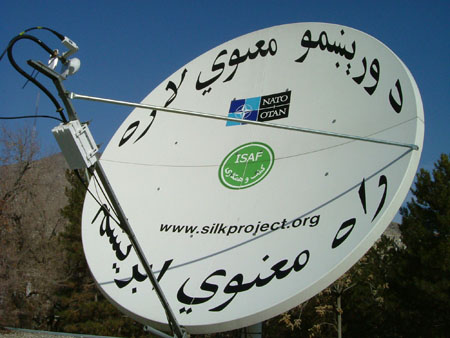SILK-Afghanistan: expanding internet connectivity (2006-2016)
Named after the Great Silk Road trading route linking Asia and Europe, the SILK-Afghanistan project provided high-speed internet access via satellite and fibre optics to Afghan universities as well as some governmental institutions in Kabul. Over a period of 10 years, the project assisted the Afghan authorities in developing their educational system. It became operational at Kabul University in 2006 and concluded in June 2016, following the expansion of the network to the provinces of Afghanistan.

SILK-Afghanistan was the sole source for providing high-speed internet access to certain Afghan institutions, originally via satellite and later through fibre optic cable. In 2014, this NATO Science for Peace and Security (SPS) Programme flagship project covered about 90 per cent of the bandwidth costs for Afghan universities and other academic and governmental institutions. These included 34 out of 36 public Afghan universities, as well as the Ministry of Higher Education itself. In 2015, SILK-Afghanistan had already connected about 150,000 students to the internet; it was estimated that in total over two million Afghans had access to the internet.
SILK-Afghanistan was jointly funded by the NATO SPS Programme and the US Department of State. In addition to internet connectivity, it contributed extra funding to build information technology (IT) infrastructure and to train IT staff at the universities.
The programme built on NATO’s experience of initiating and running the Virtual Silk Highway project, which provided high-speed internet access (via satellite) in NATO’s partner countries in the South Caucasus and Central Asia. Initiated in 2002 under the SPS Programme, the Virtual Silk Highway project provided free high-speed internet access via satellite to the academic communities in the Caucasus and Central Asian countries. Afghanistan’s Kabul University was included in 2006.
Afghanistan became a member of the TEIN4 network (Trans-Eurasia Information Network, phase 4) in 2014. This regional academic network provided a dedicated high-capacity internet network between research and education communities in the region. Co-funded by the European Commission, it was designated to take over the provision of internet connectivity following the conclusion of the SPS project. In 2016, NATO funding for the SILK-Afghanistan came to an end after a one-year extension to bridge the handover to the European Union.
